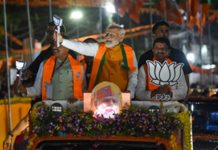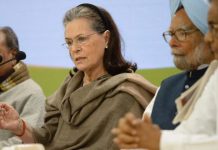 During the Bihar Assembly Election in 2015, Asaduddin Owaisi’s All India Majlis-e-Ittehadul Muslimeen embarked on a journey to enter the electoral fray in Bihar with a decision to contest 6 seats in the state.
During the Bihar Assembly Election in 2015, Asaduddin Owaisi’s All India Majlis-e-Ittehadul Muslimeen embarked on a journey to enter the electoral fray in Bihar with a decision to contest 6 seats in the state.
Interestingly, all the seats where the party contested from formed parts of the Seemanchal region. This region, close to Nepal & Bengal borders, has four districts, Katihar, Purnea, Araria, and Kishanganj with a substantial Muslim population. Critics, then, not just saw Owaisi as an underdog but also accused him of being a B -team of BJP who had marked his presence in Bihar to damage the prospects of UPAs ‘secular’ alliance against NDA.
Responding to this question of being the BJPs B team, Aadil Hasan Aazad, now a youth president of Bihar AIMIM, who had then quit Lok Janshti Party to join Owaisi assertively told this correspondent, “Anyone who opposes the pseudo-secularism of Congress and its allies becomes a B-team of BJP. Congress and its cronies including Rashtriya Janta Dal have tried to monopolise the idea of secularism in words, whereas in practice they don’t care about any participation of minorities in socio-economic and political life in the country.”
However, when the results were declared, AIMIM, indeed looked like an underdog. The party not only failed to open its account but also lost deposit on two seats. Its state president Akhtarul Imam was defeated by the Congress candidate in Kochadhaman. Congress again defeated the AIMIM candidate in Kashinganj. Aadil was defeated in Balrampur by a CPI (ML) candidate.
Two years later, in 2017, when this correspondent asked Asaduddin Owaisi about his party’s dismal performance in Bihar as they prepared to fight another assembly elections in Uttar Pradesh, the AIMIM president replied, “I am walking in the footpath of Dalit icon Kanshiram, who is also often attributed for saying this. ‘The first election is meant to be lost, second is to get noticed and the third is to win.’” Even though AIMIM was by no means a new political party, it’s newly found ambitions to represent Muslims pan India and form a new social base in alignment with Dalit’s were certainly just out of the oven.
Four years later, when the by-election results for Kishanganj seat in Bihar was declared, AIMIM Qamrul Hoda emerged as a winner defeating his rival candidate Sweety Singh from BJP. Congress in its stronghold finished third. This sweet little victory for the party came indeed after two consecutive losses. Once in 2015 Assembly Elections and then 2019 Lok Sabha elections. This victory resonates with Owaisi quoting Kashiram to this correspondent.
However, what came as a more pleasant surprise for the party was its performance in Pratapgarh, Uttar Pradesh. Here, AIMIM was making an electoral debut. Yet, its candidate, Israr Ahmad bagged 20,269 votes. The party secured around 3,000 votes less than Samajwadi Party, which took the second spot behind the winner Apna Dal, a BJP ally. In Maharashtra, the party managed to win two seats with a total vote share better than what it got in the 2014 state election.
The entry of AIMIM into the electoral fray of Hindi heartland signifies a change in the voting pattern of the Muslim community and also comes as an indication of changing political patterns. In Bihar, former chief minister and Dalit leader, Jitan Ram Manjhi has already termed this victory as an indication of a strengthening Muslim – Dalit alliance.
It is also pertinent to note that AIMIM selection of Seemanchal as a region to lay its foot is well calculated and can be seen as a ground for political experiments to strengthen its cause in North India. In this region, Muslims and SC/ST form a majority with a total population of
almost 65 per cent.
According to a party insider and close aide of the Hyderabad MP, Owaisi had his eyes on Seemanchal ever since the plan to make inroads in north India was decided after 2014 Lok Sabha election. A time frame that drastically saw rise in Owaisi’s popularity.
“To make inroads in North India, the party was looking for a region to consolidate its presence. There could be non better than Seemanchal as it was not only densely populated by Muslims but also the most backward region in the country. This is when a unit was set up there and faces were identified to work with the outfit there,” said the insider.
Interestingly, in the past few years, Asaduddin Owaisi has made consistent reference to Seemanchal in the parliament and has also introduced a private member bill for special status to the region.
Aadil Hasan Aazad, the youth president of the party’s Bihar wing believes that this victory in Kishanganj is people’s rejection of being taken for granted by called secular outfits on one hand and BJPs communalism on the other.
“Seemanchal is the most backward region of the country, it lags much behind with other areas in terms of all development and poverty indicators. It is prone to flood every year, which leads to large scale disasters in the region. Ironically, the government of Bihar and India cites Seemanchal’s deplorable condition to get funds from many international aid agencies and yet spend nothing for the welfare of people here. A branch of Aligarh Muslim University that was set up here remains ignored. And yet you expect people to vote in favor of Congress and BJP here. The harsh truth is that both the political outfits have ignored this region completely and left it in an era of darkness. Congress believes that Muslims/Sc/St have no other choice other than voting for them while for BJP these communities are untouchables as they do not form a part of their voter base,” says Aadil.
This discourse that secular outfits have taken Muslims for granted, paints Owaisi’s model of politics as self-representation by some Muslims. Adnan Farooqui and Rochana Bajpai in an academic paper, titled, Non-extremist Outbidding: Muslim Leadership in Majoritarian India, the duo wrote, “Owaisi’s exhortations … has an anti-paternalist thrust similar to arguments associated with the emergence of lower caste political parties in the 1980s-1990s.”
Ovais Sultan Khan , a human rights activist, believes that increasing invisibility of Muslims from public life, almost deserted by so-called secular parties, Muslims have been compelled to move towards AIMIM.
“Post 2014, we have seen an interesting phenomenon, most of the so-called secular outfits have deserted the Muslim community. This phenomenon also extends to the civil society where people do talk about violations of human rights but refrain from using the word Muslim. This has caused a sense of existential crisis among the Muslim community.
Asaduddin Owaisi has not just extensively talked about Muslims but has also given them a democratic framework to talk about community issues, underlining constitutionalism as a principle. In these circumstances, it is natural for Muslims to move towards Owaisi’s party.” Ovais told Tehelka.
“It is not just Muslims, but also people from other minorities like Christian and Sikh community who also believe that Owaisi can emerge as their leader against the rising phenomenon of Hindutva in India,” added Ovais.
However, Arshad Alam, former associate professor of Sociology at JNU, based in Delhi believes that the chances of Owaisi’s party expanding its footprint in other parts of North India don’t look like a reality shortly unless it forms a larger social alliance.
“It would be too early to say that AIMIM will expand its base in other parts of north India just because it has been able to win the Kishanganj assembly which is a Muslim majority seat. To expand its base, Owaisi will have to work more towards forming a new social alliance with other marginalised communities. Until that happens, it wouldn’t be wrong to see the outfit’s victory in isolation on a Muslim majority seat,” Arshad explains.
Meanwhile Owaisi, detractors continue to rule this out as a phenomenon that there might me various local reasons for AIMIM’s victory in Kishanganj assembly seat including candidate’s popularity.
“We refuse to believe in this binary that Muslims are going towards Owaisi and that it will have an impact on the prospects of secular outfits like us. RJD has for long been an un compromised outfit on secular causes and anyone who believes in the idea of common existence continues to support us. AIMIMs victory can be attributed to local factors and not an ideological shift in Muslim votes,” said Naval Kishore, Spokesperson of RJD who also teaches at Delhi University.
It will be interesting to see whether AIMIM works gets noticed in other parts of North India with Seemanchal as its base.
letters@tehelka.com












